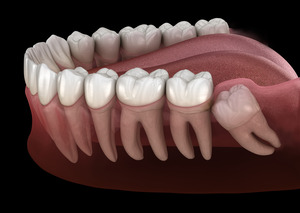
The vast majority of adults in the United States – more than 90%, in fact – have their wisdom teeth taken out. However, this procedure isn’t always necessary; some people are able to keep their wisdom teeth without issue. Is wisdom teeth extraction actually needed in your case? Here are the facts that can help you find the answer to this question.
What are the Wisdom Teeth?
The wisdom teeth are a third set of molars that emerge far later than your other teeth. At one point in history, our ancestors may have needed wisdom teeth to help them chew tough foods. Nowadays, though, we tend to enjoy much softer diets. As such, wisdom teeth aren’t actually needed for your mouth to function properly, so if they start doing more harm than good, it’s often recommended to have them extracted.
How Can You Tell If Your Wisdom Teeth Need to Be Removed?
If your wisdom teeth have erupted successfully, are in good health, and don’t seem to be causing any problems, you may be able to keep them. On the other hand, your wisdom teeth will most likely need to be removed if any of the following symptoms occur:
- Impaction: Your wisdom teeth may not be able to erupt properly, thus becoming partially or fully trapped beneath your gums.
- Coming in Wrong: Sometimes a lack of space can cause your wisdom teeth to come in sideways or become misaligned in other ways.
- Pain: Wisdom teeth that are trapped under the gums are known to cause significant discomfort.
- Cavities: Sometimes wisdom teeth can increase your risk for tooth decay by making it difficult to brush properly.
- Cysts: It’s possible for cysts to form around impacted wisdom teeth. Not only can this be painful, but it may also damage your jawbone or your tooth roots.
You should speak to an oral surgeon if you suspect that your wisdom teeth need to be taken out. They can take X-rays and evaluate the state of your mouth to determine whether an extraction is truly needed.
How Does Wisdom Tooth Extraction Work?
An impacted wisdom tooth must be removed via surgery. The gums will need to be opened, and a small amount of bone will likely have to be taken out. Extracting the actual tooth may sometimes involve dividing it into smaller sections first. At the end of the procedure, you will receive sutures to aid with healing.
While not everyone requires a wisdom tooth extraction, it can often be crucial for protecting your oral health. Contact your oral surgeon today if you have concerns about your wisdom teeth and think that they may need to be removed in the near future.
About the Author
Dr. Hasnain Shinwari studied dentistry at the University of Peshawar in Pakistan, and he went to Boston University for training in oral and maxillofacial surgery. He regularly performs wisdom tooth extractions in order to help his patients avoid further pain and dental damage. To schedule a consultation with Dr. Shinwari at Oral & Facial Surgery Center of Virginia in Dumfries, visit his website or call (703) 574-4717.

